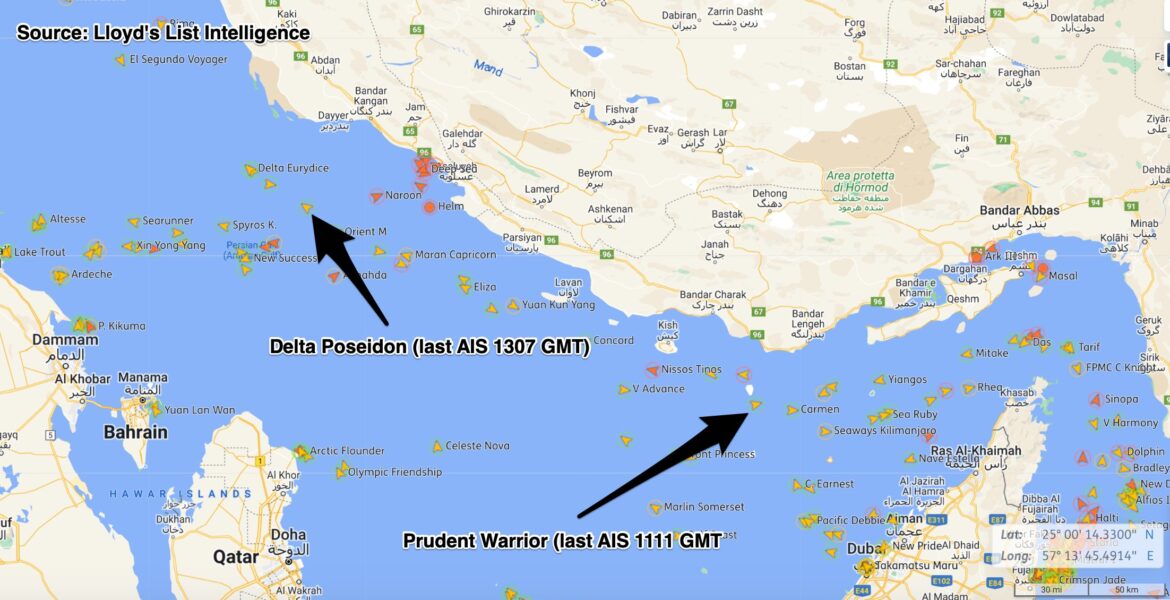The Greek Foreign Affairs Ministry submitted a strong demarche to Iran's ambassador in Athens concerning the "violent seizure" of two Greek-flagged ships by Iranian naval forces in the Persian Gulf on Friday.
This was carried out by the ministry's General Secretary Themistoklis Demiris, by order of minister Nikos Dendias.
Describing the incident, the Greek ministry said that an Iranian navy helicopter landed on the Greek-flagged ship 'Delta Poseidon' which was sailing in international waters 22 nautical miles off the coast of Iran. Armed men then captured the ship's crew, including two Greek citizens.
"These acts are equal to piracy," noted the Greek ministry in its announcement, adding that Demiris condemned them as violating fundamental principles of International Law and International Navigation and called for the immediate release of the ships and their crews. Demiris also said that these acts will be particularly detrimental to bilateral relations as well as to EU-Iran relations.
"A similar incident reportedly took place on another Greek-flagged ship that was sailing near the Iranian coast with seven Greek nationals on board" on Friday, added the statement.
"Greece has already notified both the European External Action Service (EEAS) and the International Maritime Organization (IMO), as well as allies and partners about the maritime incident," noted the ministry, while issuing a recommendation to people in Greece to avoid traveling to Iran for the time being.
Finally, it was noted that the Greek-flagged ships are now required to follow the instructions of the Greek Ministry of Shipping & Island Policy, with which the Greek Ministry of Foreign Affairs is in close coordination and constant communication.
The move came as the US government seized a cargo of Iranian crude oil in April from a Russia-flagged tanker being held in Greek waters and chartered a Greek-owned tanker to transport the oil back to the US.
The Russia-flagged aframax Lana (IMO: 9256860), formerly named Pegas, was detained on April 15 by Greek authorities and had been waiting at Karistos port pending a court ruling.
On Monday afternoon a Dynacom-owned tanker Ice Energy (IMO: 9301732) started a ship-to-ship transfer with the Lana in Greek waters four miles off the coast of Karistos. The operation, first reported by US lobby group United Against Iran on Twitter, was verified using Lloyd's List Intelligence data.
Lloyd’s List understands that the George Procopiou-controlled tanker has been chartered by the US Department of Justice to transfer the oil to the US.
The US Department of Justice was not available to comment on the operation.
The US practice of seizing sanctioned cargos from vessels has proved controversial inside the maritime insurance community and sparked several legal challenges in similar cases.
While the details of this case are yet to be made public, the US has previously argued that such seizures were legal when linked to a US-sanctioned Iranian terrorist group, giving them jurisdiction to act in international waters.
The move to seize Lana’s cargo ends weeks of speculation over how the Greek detention would play out. The 2003-built aframax Lana was originally detained on April 15 based on the vessel’s former Russian ownership, not its Iranian cargo. The seizure notice was later withdrawn as the new registered owner was not on any European Union sanctions list.
The vessel was owned by Russia’s Promsvyazbank and registered to the bank’s financial subsidiary, PSB Leasing, according to Lloyd’s List Intelligence data.
Its registered ownership and ISM management was then changed to TransMorFlot in March, while beneficial owner has changed to Jamaldin Pashaev, a Russian national.
The US designated Promsvyazbank and its 42 subsidiaries on February 22 in a move designed to thwart Russian action in Ukraine. On March 2, the European Council said it would prohibit Swift financial messaging services to the bank and six others, along with capital market restrictions following Russia’s invasion of Ukraine on February 24.
There were no legal grounds to impound the ship following checks and the coast guard had been ordered by the anti-money laundering authority to release the vessel, Reuters reported, citing official Greek sources. No further details were provided and no date was given for its departure.
According to Lloyd’s List Intelligence data, the vessel had been expected at the Marmara terminal in Turkey in January, and the vessel ended up in Greek waters unintentionally.
Following engine failure, the vessel was being towed when inclement weather forced it to anchor at the port of Karistos. Several other deficiencies were found upon inspection.
Lloyd’s List understands that the mechanical failures of the ship were the reason behind the US DoJ’s decision to charter Dynacom’s Ice Energy to transfer the cargo and transfer it to the US.


